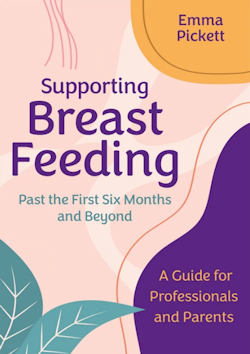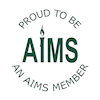Book review by Lesley-Sheena Robbins

“Supporting Breastfeeding Past the First Six Months and Beyond”, by Emma Pickett, is available from Jessica Kingsley Publishers for £24.99
In her book, Emma Pickett skilfully evokes honest reflection and knowledge into the personal journey of natural term breastfeeding. She aptly relates evidence-based sources and draws upon stories from breastfeeding families and healthcare professionals from across the UK to facilitate a 4-dimensional view on breastfeeding beyond the early months.
There are many misconceptions around breastfeeding past 12 months; even more so beyond 2 years. I should confess that prior to reading Pickett’s book, I considered myself to be progressive in my approach and support of breastfeeding beyond 6 months, however, soon after I read the first chapter, some of the rather deeper ingrained misbeliefs of breastfeeding I held were exposed.
In the introduction she affirms that all families who breastfeed are not the same and further continues to lay the foundation by addressing some misconceptions, language and the impact that healthcare providers can have on the success of a family’s breastfeeding journey. Pickett makes an invaluable point: We are all at risk of projecting our personal biases onto the families we support, and that it takes great effort and skill to acknowledge this and to work alongside them. She encourages professionals to exercise continued ‘reflective practice’, which is described as confessing and evaluating your triggers, perhaps with a mentor or trusted accountability partner. Thankfully mentoring is already something which is instilled at Nurturing Birth, so I could immediately appreciate the value of reflection with a mentor on some of the more uncomfortable ideas around breastfeeding an older nursling.
There is compelling evidence surrounding the benefits of exclusive breastfeeding during the first 6 months of a baby’s life. The NHS guidance states that at 6 months of age, solids should be introduced alongside breastfeeding, which is often misunderstood to mean that breastfeeding should stop at 6 months. This misunderstanding is so compelling that there is often a lack of support and understanding when families choose natural term breastfeeding. Pickett argues that surely there is enough value in the continuation of breastfeeding simply because parents desire to do so. Though I wholeheartedly agree with Pickett, there are and will be instances where families need resources to support their decisions so I was delighted when she shared a very helpful list of references including an excerpt from Breastfeeding Medicine 2012, which states that ‘Claims that breastfeeding beyond infancy is harmful to mother or infant have absolutely no medical or scientific basis… Indeed, the more salient issue is the damage caused by modern practices of premature weaning’. As someone who enjoys introspection, I appreciated the opportunity to reflect on my personal breastfeeding journey as prompted by the reflective questions at the end of the second chapter.
Most people would agree that breastfeeding is not easy and that support is invaluable. I was struck by the number of references to social media support groups. I realised that our society accepts that online support groups form an integral part of our support network. It can be a tremendous source of support for families, in particular parents who nurse their older children in communities where there are few or no examples of this. Though support groups can be very beneficial, there is much that can be said about the impact of a partner or extended family members on the success of natural term breastfeeding. Some of the qualities that make up a supportive partner include being present, continued positive affirmations and practical support. When a partner is available to listen, offer reassurance and affirmation, it significantly contributes to the positive wellbeing of the breastfeeding partner and in advertently affects the wellbeing of the child too. Pickett states that ‘single parents who breastfeed are amongst the most empowered and thriving as they make decisions that suit them and their child’. Wider family members can have a significant impact on the success of breastfeeding for a family. Pickett quotes an extract from Negin et al. 2016, which states that “A grandmother’s positive breastfeeding opinion had the potential to influence a mother [to such an extent that she is] up to 12% more likely to initiate breastfeeding. Conversely a negative opinion has the capacity to decrease the likelihood of breastfeeding by up to 70%.” It is incredible to think of the potential of influence of the extended family.
In the absence of experience or knowledge of helpful resources, parents of older nurslings are often told that it is fine to end their breastfeeding journey because their child now receives the majority of their nutrition from food, and that they have done well to get as far as they have. Little effort is put into offering parents helpful resources so that they can reach their breastfeeding goals. However, in the remaining chapters, Pickett offers parents alternative solutions to common misconceptions and challenges that arise along the journey, such as how to continue to provide breastmilk successfully alongside solids, how to navigate interrupted sleep and breastfeeding, returning back to work and getting pregnant again.
I spent a lot of time reflecting on the chapters ‘Nursing Manners and Communicating Limits and Returning to Work’. I wanted to really soak up the revelation that breastfeeding is a mutual journey and should work for both parties. The needs of the nursing parent are equally as important as the nursling’s because they are both human beings. Breastfeeding, after all, is much more than just milk production. It is OK to set limits. It serves as a great reminder, too, that working parents who breastfeed have rights, and that they can, and should be empowered to advocate for their health and safety needs.
Pickett’s book is timely and should be read by everyone who supports or is interested in breastfeeding beyond the first months. I think it is a great signposting resource for parents at every stage of breastfeeding. I would go as far as recommending it particularly to parents during their antenatal period as it offers one the opportunity to think about goals as well as groups and resources to visit when you encounter difficult times along the way. For people who feel that they have finished their breastfeeding journey, this can also be a useful resource as we are constantly surrounded with friends and family who are starting or continuing on their own journey. The other group of people who would find great use from this book are healthcare professionals, particularly those who offer one-to-one support to families and children. It can offer a different perspective through the personal stories of families in the book but also as reference to evidence-based resources. Maybe it will even inspire new studies in this incredibly important topic.
Lesley-Sheena Robbins is a Nurturing Birth Doula. Click here for the link to Lesley-Sheena’s Nurturing Birth Directory entry.






